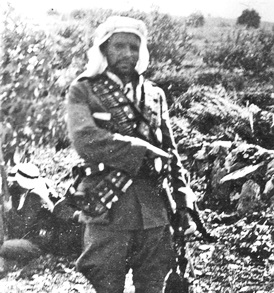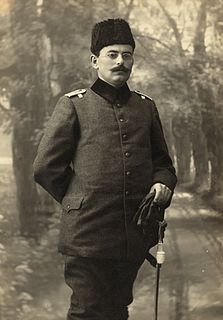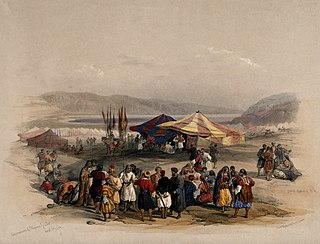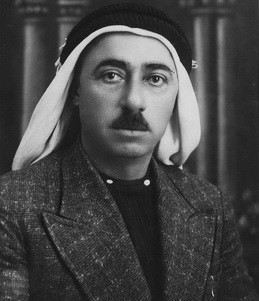 W
WKarimeh Abbud, was a Palestinian professional photographer and artist who lived and worked in Palestine in the first half of the twentieth century. She was one of the first woman photographers in the Arab World.
 W
WYusuf Sa'id Abu Durra was one of the chief Palestinian Arab rebel commanders during the 1936–39 Arab revolt in Palestine. Abu Durra was a close disciple of the Muslim preacher and rebel Izz ad-Din al-Qassam and one of the few survivors of a shootout between British forces and Qassam, in which the latter was killed. When the revolt broke out, Abu Durra led bands of Qassam's remaining disciples and other armed volunteers in the region between Haifa and Jenin. He also administered a rebel court system in his areas of operation, which prosecuted and executed several Palestinian village headmen suspected of colluding with the British authorities. After experiencing battlefield setbacks, Abu Durra escaped to Transjordan, but was arrested on his way back to Palestine in 1939. He was subsequently tried later that year and executed by the authorities in 1940.
 W
WRadi Hassan Annab (1897–1999) was the first Arab commander of the Arab Legion when it concurrently became the Jordanian Armed Forces.
 W
WAqil Agha al-Hasi was the strongman of northern Palestine in the mid-19th century, during Ottoman rule. He was originally a commander of Arab irregular soldiers, known as the Hawwara tribe, in the service of the Ottoman governors of Acre. His influence in the Galilee grew as he strengthened his alliances with the powerful Beni Sakhr and Anizzah tribes of Transjordan, and recruited unemployed Bedouin irregulars from Egypt into his own band of irregulars, who thenceforth became known as the Hanadi tribe. He was known by his men and Western travelers to be courageous, cunning and charismatic, all qualities that contributed to his rise as the de facto ruler of Galilee.
 W
WAref al-Aref was a Palestinian journalist, historian and politician. Aref al-Aref served as mayor of East Jerusalem in the 1950s, during the Jordanian annexation of the West Bank.
 W
WKhalil Beidas (1874–1949), was a Palestinian scholar, educator, translator and novelist. Beidas was the father of Palestinian Lebanese banker Yousef Beidas and was a cousin of Edward Said's father.
 W
WTawfiq Canaan was a pioneering Palestinian physician, medical researcher, ethnographer, and Palestinian nationalist. Born in Beit Jala during the rule of the Ottoman Empire, he served as a medical officer in the Ottoman army during World War I. During British rule, he served as the first President of the Palestine Arab Medical Association founded in 1944, and as the director of several Jerusalem area hospitals before, during, and after the 1948 war. Over the course of his medical career, he authored more than thirty-seven studies on topics including tropical medicine, bacteriology, malaria, tuberculosis, and health conditions in Palestine, and contributed to research that led to a cure for leprosy.
 W
WAref Basha al-Dajani was an Arab Palestinian politician who served as mayor of Jerusalem in 1917–1918.
 W
WMuhammad 'Izzat Darwazeh was a Palestinian politician, historian, and educator from Nablus. Early in his career, he worked as an Ottoman bureaucrat in Palestine and Lebanon. Darwaza had long been a sympathizer of Arab nationalism and became an activist of that cause following the Arab Revolt against the Ottoman Empire in 1916, joining the nationalist al-Fatat society. As such, he campaigned for the union of Greater Syria and vehemently opposed Zionism and foreign mandates in Arab lands. From 1922 to 1927, he served as an educator and as the principal at the an-Najah National School where he implemented a pro-Arab nationalist educational system, promoting the ideas of Arab independence and unity. Darwaza's particular brand of Arab nationalism was influenced by Islam and his beliefs in Arab unity and the oneness of Arabic culture.
 W
WAhmad Agha Fadhelaldin Agha Al-Asali Duzdar was mayor of Jerusalem and Governor of Jerusalem from 1838 to as late as 1863.
 W
WMohamed Ali Eltaher was a Palestinian journalist and newspaper editor.
 W
WFaidi al-Alami was Mayor of Jerusalem from 1906 to 1909. In 1914, he was chosen to represent the city in the Ottoman parliament. His father, Musa al-Alami, was also a mayor of the city
 W
WAbd al-Rahim al-Hajj Muhammad, also known by his kunya Abu Kamal, was a prominent Palestinian Arab commander of rebel forces during the 1936–39 Arab revolt against British Mandate rule and increased Jewish settlement in Palestine. Most of his activities were based in the areas of Tulkarm, Nablus and Jenin. In September 1938, he became the official General Commander of the Revolt, although he shared the post in rotation with Arif Abd al-Raziq. In February 1939, al-Hajj Muhammad was given sole title to the post by the revolt's political leadership, but was killed the following month in a firefight with British forces.
 W
WHussein Bey al-Husayni was mayor of Jerusalem from 1909 to 1917, the last years of Ottoman rule over the city.
 W
WJamal al-Husayni (1894-1982) was born in Jerusalem and was a member of the highly influential and respected Husayni family.
 W
WKamil al-Husayni was a Sunni Muslim religious leader in Palestine. He was the Hanafi Mufti of Jerusalem from 1908, and in 1918 the British Mandate authorities appointed him as the first "Grand Mufti of Jerusalem", a title they had copied from the Grand Mufti of Egypt. The British referred to him as "the representative of Islam in Palestine and a member of the oldest nobility of the country".
 W
WMusa Kazim Pasha al-Husayni held a series of senior posts in the Ottoman administration. He belonged to the prominent al-Husayni family and was mayor of Jerusalem (1918–1920). He was dismissed as mayor by the British authorities and became head of the nationalist Executive Committee of the Palestine Arab Congress from 1922 until 1934. His death was believed to have been caused by injuries received during an anti-British demonstration.
 W
WFahmi Bey al-Husseini was the mayor of Gaza, his hometown, from 1928 to 1939 while Palestine was under the British rule.
 W
WRashid al-Haj Ibrahim (1889–1953) was a Palestinian Arab banker and a leader of the Independence Party of Palestine (al-Istiqlal). He was one of the most influential Arab leaders of Haifa in the first half of the 20th century and played a leading role in both the 1936–39 Arab revolt and the 1948 Battle of Haifa.
 W
WAmin-Salim Jarjora was an Israeli Arab politician who served as a member of the Knesset for the Democratic List of Nazareth between 1949 and 1951.
 W
WWasif Jawhariyyeh was a composer, oud player, poet and chronicler. He is known for his memoirs, The Diaries of Wasif Jawhariyyeh, that spans over six decades from 1904 to 1968, covering Jerusalem's turbulent modern history, including four regimes and five wars.
 W
WElias Nakhleh was an Israeli Arab politician who served as a member of the Knesset between 1959 and 1974.
 W
WRaghib al-Nashashibi (1881–1951), CBE (hon), was a wealthy landowner and public figure during the Ottoman Empire, the British Mandate and the Jordanian administration. He was a member of the Nashashibi clan, one of the most influential families in Palestine, and mayor of Jerusalem from 1920 to 1934.
 W
WKhalil al-Sakakini was a Palestinian Orthodox Christian teacher, scholar, poet, and Arab nationalist.
 W
WHajj Sa'id al-Shawwa was a Palestinian Arab politician and the first mayor of Gaza, serving from 1906 to 1917. He was also one of the most influential members of the Supreme Muslim Council from 1921 until his death. He was an opponent of British mandatory rule in Palestine, supporting the Ottomans during World War I and later the nationalist Grand Mufti of Jerusalem, Amin al-Husayni.
 W
WMuhammad Rafiq al-Tamimi was a Palestinian Arab educator and political figure in the 20th century. He was appointed to the Arab Higher Committee in 1945 and was the chairman of the Palestinian Arab paramilitary scout movement, al-Najjada (1945–47).
 W
WZahir al-Umar al-Zaydani, alternatively spelled Daher al-Omar or Dahir al-Umar was the autonomous Arab ruler of northern Palestine in the mid-18th century, while the area was still nominally part of the Ottoman Empire. For much of his reign, starting in the 1730s, his domain mainly consisted of Galilee, with successive headquarters in Tiberias, Arraba, Nazareth, Deir Hanna and finally Acre, in 1746. He fortified Acre, and the city became a center of the cotton trade between Palestine and Europe. In the mid-1760s, he reestablished the port town of Haifa nearby.